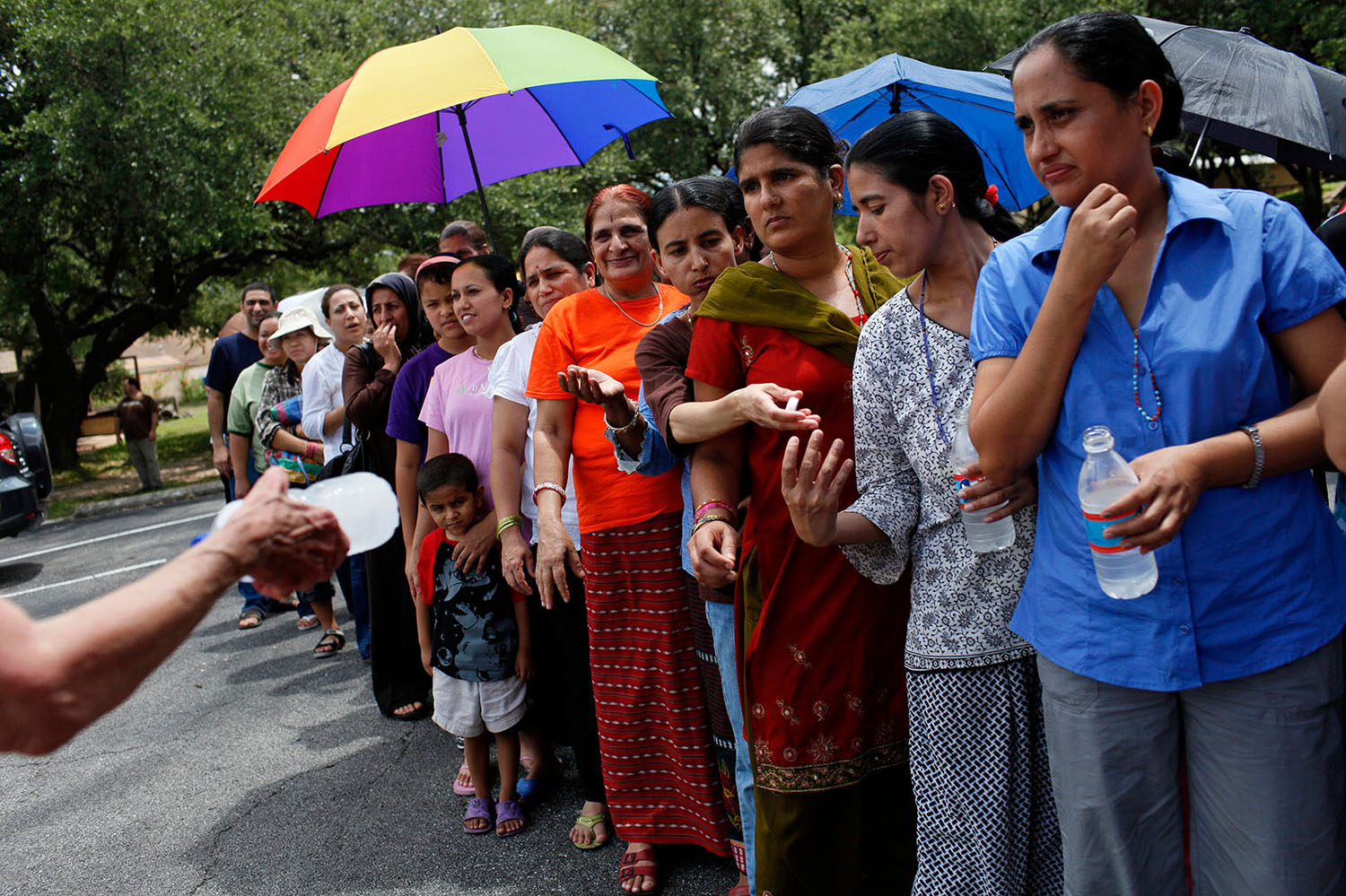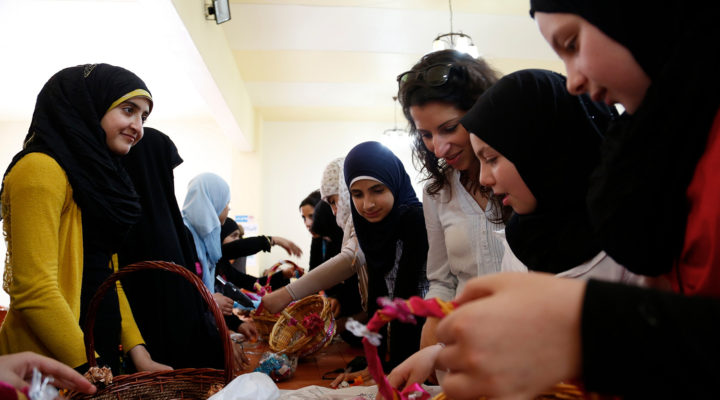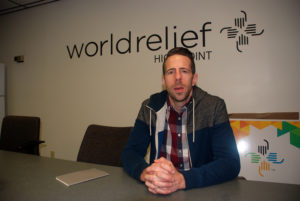The limit President Trump has placed on the number of refugees who can enter the U.S. has devastated those who have languished in overseas refugee camps for years.
While the travel-ban portion of Trump’s second executive order has been placed on hold by a federal judge, the part slashing refugee resettlement from 110,000 to 50,000 is already in effect – and has been since the first unsuccessful order issued in January.
“The most affected by this order are the refugees, the ones waiting to come to this wonderful country,” said Ali Al Sudani, director of refugee services for Interfaith Ministries for Greater Houston. That agency is contracted by the federal government to resettle refugees in the region.
But the frustration and suffering affects thousands in the United States, too, say Al Sudani and others who work with refugees in the U.S.
Those affected include church groups trained to help refugees – fewer refugees could mean fewer opportunities to answer those callings.
Also challenged are the nonprofit groups that coordinate with the federal government to help those seeking a new life in the United States. Others include foreigners legally in the U.S. who are blocked from long-awaited reunions with family currently overseas.
Better equipping refugees
Religious groups potentially face major disruption in their ability to minister to refugees.
Organizations like Interfaith Ministries in Houston are assigned a certain number of refugees each year by the federal government. In turn, they work with local religious and civil groups who are assigned to help refugee families settle into their new nation, cities and homes.
Those church groups usually are marked by a passion to serve people on the margins of society, and see refugees as a part of that group.
News reports and social media images of the plight of Syrian refugees a couple of years ago inspired many individuals and congregations to help.
“We were heartbroken by the images on TV in 2015,” said Diane Lipsett, a member of Knollwood Baptist Church in Winston-Salem, N.C.
So, she and other members of the congregations got involved.
“We did some short-term projects, but were looking for longer term commitments,” Lipsett said during a FaithSoaring Churches Learning Community conference call earlier this month. Refugee resettlement was the topic of the call.
The church then found World Relief High Point/Winston-Salem, an evangelical organization that coordinates refugee resettlement in that part of North Carolina.
The church had enough volunteers to compose three Good Neighbor Teams, each of which is trained and assigned by World Relief to commit to one refugee family for at least six months.
The teams meet the new arrivals at the airport and help them settle into their new surroundings. They connect them with others from their native countries and accompany them to doctor appointments and government offices. It’s also common for them to show the new arrivals how to find good schools for their children and how to shop at grocery stores.
At Knollwood and other churches that form those teams, the rest of the congregation participates in clothing, furniture and other drives on behalf of those families. They also will decorate homes or apartments.
World Relief resettled 600 refugees in 2016 and was approved for 675 for this year – until President Trump’s orders were issued.
“That will now be substantially lower,” said Joe McCann, who runs church engagement for World Relief in High Point/Winston-Salem.
McCann said there have been a few short periods during which some volunteer groups have had to wait longer than expected to greet their refugee arrivals.

A volunteer, at right in white shirt, helps refugee girls prepare gift baskets. (Photo/Lisa Krantz/[email protected]/Creative Commons)
So the organization has switched gears when necessary by assigning volunteers to help refugees who have already been settled.
“There are always things you wish you were doing better to … better equip refugees,” McCann said.
At the moment, arrivals are occurring but they don’t know when they will stop, impacting engaged religious groups and other volunteers.
“We’re really looking to take this time and find out how we can better equip the local church and community and better serve our refugees,” he said.
Refocusing energies
Back at the office things are tougher.
When agencies contract with the federal government to resettle refugees, they are given a certain number of people – and money – for a fiscal year. When the number of refugees is cut, so are the dollars they receive.
“Layoffs are another impact,” McCann said. “Our revised number is more than half, overall.”
World Relief in High Point/Winston-Salem has already scaled back its staffing and budgets – “enormously,” he said.
Similar pressures are being felt in other organizations that serve refugees.
In Houston, Interfaith Ministries was originally told to prepare for 714 refugees this year.
“Now I think we will be getting about half this number,” Al Sudani said.
The staff has been cross-trained to provide a variety of services.
“It will have an impact on our operations, for sure,” he said. “We will scale up and down based on refugee arrival.”
The agency will also rely more heavily on churches and other religious groups.
“We are encouraging these churches and volunteers to guide their energies to working with someone five, six and seven months,” Al Sudani said.
‘I just want to see my parents’
Another kind of pain is being felt among refugees and other foreigners who cannot bring loved ones to the U.S., said Nell Green, Cooperative Baptist field personnel based in Houston.
Green and her husband, Butch, work intimately with refugees and with the churches that minister to them.
“Everyone is scrambling to see what can be done to possibly find a way to bring families to visit,” she told Baptist News Global via email. “For most it is not a question of families coming to live, though that affects some, it is the ability to even be able to go visit family or have family come visit them.”
Amireh, an Iranian living in Texas on a student visa, said she and a number of her friends are experiencing that painful situation since Trump became president.
Even though she and her friends are not refugees — and neither are their families — the U.S. has been making it increasingly difficult for people there to get work, student and tourist visas in Iran. It’s done by denying or canceling visits at U.S. embassies in neighboring countries.
“It’s so hard, emotionally,” said Amireh, whose real name is not being used to protect her identity.
“I know a friend who wanted to invite her parents to her wedding, but they couldn’t come.” Another friend had a similar experience “when she had her first baby.”
Amireh wanted to invite her parents to her doctorate studies graduation. It didn’t happen.
These difficulties have been going on for months, she said.
“When we had that second ban, I just broke down. Oh my God, I just want to see my parents.”
She said it’s difficult to find America so unwelcoming after she sought a better life here than available in Iran.
People of faith who work with refugees are praying that the changes they are experiencing will somehow improve the process.
“When we think what the future might look like, we don’t want to just wait and see – we want to be strategic and thoughtful about it,” said McCann.
“And we are going to watch God do what he often does, which is taking a situation which is not great and turning it around and using it to his good,” he said.




